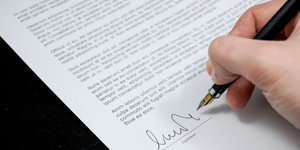"A man can do all things if he but wills them."
Leon Battista Alberti
Legal specialist in providing Later Life estate planning solutions and advising vulnerable clients.
What should be in estate accounts?
1 May 2022 by Gavin Ball Probate Services

Gavin says: After a death, the deceased’s executor or administrator has the job of winding up the estate. Once this has been done, they are required to provide a final estate account, setting out all of the assets, income, liabilities and expenses as well as the amount that is payable to the beneficiaries.
Administering an estate involves closing the deceased’s accounts and encashing investments, with the money paid into an executors’ bank account. Items such as cars and jewellery will generally be sold, unless they have been left to someone in the Will.
The first stage of estate administration is to value all of the assets so that it can be established whether any Inheritance Tax is due. If it is, it will generally need to be paid before a Grant of Probate or a Grant of Letters of Administration is applied for. This is the document that gives the estate executor or administrator the authority to deal with the finalisation of the deceased’s affairs. The valuation figures and the Inheritance Tax calculations will need to be included in the accounts.
What are Estate accounts?
During the administration it is important to keep detailed records of all of the estate income, expenditure, debt and interest. Once all of the financial affairs have been dealt with, these figures need to be put into accounts. While there is no standard layout for estate accounts, they generally include the following:
Front sheet
This should state the deceased’s name and date of death and that the following pages are the estate accounts.
Assets
This is a list of the investments, bank accounts and items such as cars or property that the deceased owned. The value at the date of death should be stated.
Liabilities
All money owed by the deceased should be included, such as the amount outstanding on a mortgage, credit card debts, tax that is due and utility bills.
Inheritance Tax account
The Inheritance Tax account is where you will set out the calculations if Inheritance Tax will be payable. You will need to work out whether Inheritance Tax is due and, if so, set out any exemptions that apply. For example, if the deceased was married and their spouse predeceased them and did not use their Inheritance Tax allowance, known as the nil-rate band, then the accounts can show both the deceased’s allowance and the spouse’s allowance, as any unused portion is transferrable. Calculating Inheritance Tax can be complicated and you may wish to seek professional help in working out whether it is payable and, if so, how much is due. If errors are made, the estate executor or administrator could be liable to pay penalties.
Capital account
The capital account is where you need to note any changes in the value of the estate compared to the figure that was estimated at the start when Inheritance Tax was paid. For example, the estimated value of a property could be different to the actual figure achieved on sale. The difference should be included in this section of the accounts.
Income account
The estate assets may accrue income during the winding-up period. For example, rent on property, interest on savings accounts and dividends from shareholdings. Where income exceeds £100, income tax is payable and should be noted on this page.
Estate expenses
Estate expenses include professional fees, such as solicitors’ costs for carrying out the administration and any conveyancing, as well as disbursements such as the Probate Registry fee, statutory advertisements, estate agency fees and insurance payments for cars and property.
Distribution account
The distribution account will set out the totals of all of the other pages, with liabilities and expenses deducted from the total of assets and income. The figure for the net estate will then be apportioned in accordance with the Will or Rules of Intestacy, showing how much each beneficiary is entitled to.
Signature page
The executor or administrator can sign a statement on the final page confirming that the accounts are accurate.
When the estate is distributed to the beneficiaries, they should also be asked to provide a receipt.
Estate accounts can be complex and professional help may be needed to complete them correctly.
Estate accounts are an essential summary of the process of the administration, listing all the assets and liabilities of the deceased, showing the realised values of those assets and the estate expenses paid and the ultimate value of the distribution to the beneficiaries.
Should you need help with the administration of an estate or completing the estate accounts, contact me now on 01404813676 or by email on gavin@gavinball.co.uk for an introductory free 30 minute consultation when I will consider the estate that needs administering and show you how I can help you.
Thanks Scott Graham from Unsplash for use of the image

About the Author - Gavin Ball:
Legal specialist in providing Later Life estate planning solutions and advising vulnerable clients.Search blog
Post categories
- Asset Protection 0
- Care Fee Planning 1
- Deputyship Orders 1
- Lasting Power of Attorney 3
- Probate Services 9
- Wills 5



